
Purification of the Bacterial Amyloid Curli from Escherichia coli
Erica Andres
Neurodegenerative diseases (ND) are a class of disorders that feature the accumulation and aggregation of normal human proteins, called amyloids, in the central nervous system. ND is highly prevalent with 1 in 6 individuals becoming affected. Salmonella and E. coli are pathogenic bacteria that are able to form biofilms in the digestive tract. One component of these biofilms is the protein curli. This protein has a similar structure to human amyloid beta, the amyloid plaque that accumulates in the brain of Alzheimer’s patients. Work in our lab has shown that Salmonella curli can interact with human amyloid beta peptides, causing aggregation. Our hypothesis is that E. coli curli behaves similarly. As over 95% of the population has E. coli in their gut, this could have significant implications for the progression and frequency of ND. In order to run assays to test our hypothesis we need to purify E. coli curli, a process that had only been done in Salmonella thus far.
